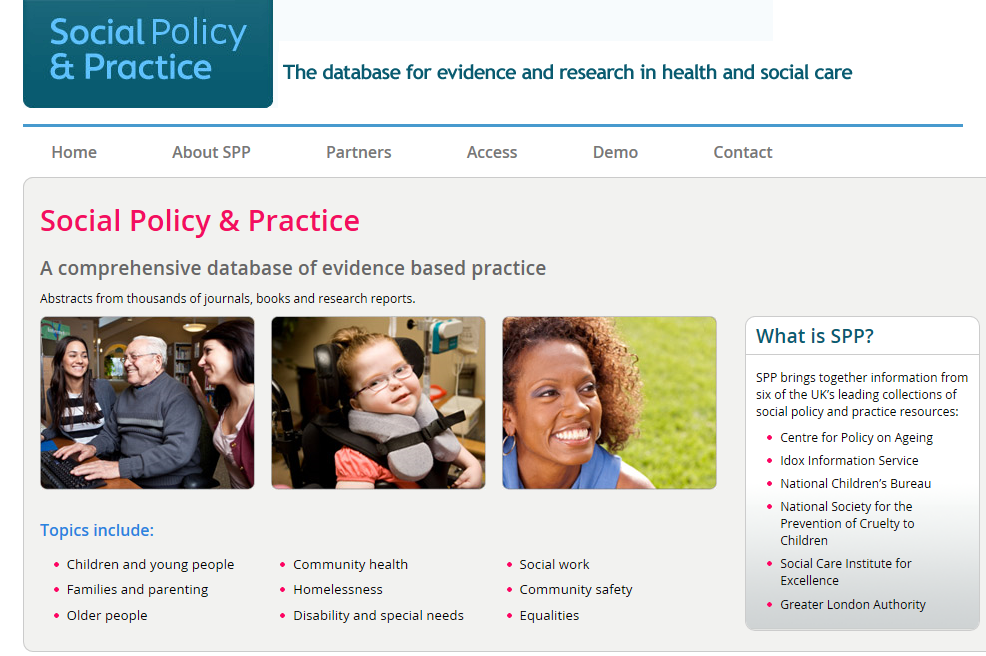
We’re proud to be part of the publishing consortium which creates Social Policy and Practice, the only UK-produced social science database focused on social care, social services, public health, social policy and public policy.
So we’re thrilled that during October anyone can get free access to the database via Ovid and Wolters Kluwers’ Health, the internationally-recognised leader in medical information services.
There’s still a few days left of the special offer, so why not test drive it for free!
Addressing priorities in public health
Over the last few years there have been major changes in the public health landscape in the UK. Responsibility for commissioning many public health services moved from the NHS to local authorities, as a result of government reforms.
The King’s Fund has suggested that one challenge of this shift has been bridging the cultures of the NHS and local authorities. In particular there were clear differences in the understanding, value and use of evidence to determine decision-making and policy.
The continuing pressure on local authority budgets has also threatened the focus on prevention and joined up service delivery which is essential for tackling many public health issues.
Recent feedback on Social Policy and Practice has highlighted its strong coverage of many current priority issues in public health, such as:
- dementia care
- delayed discharge
- funding of long term care
- safeguarding of both children and adults
- supporting resilience and well-being
- tackling obesity
- asset-based approaches
As a UK-produced database you will also find information on topical policy issues such as minimum alcohol pricing, sugar taxes, and the possible impact on the health and social care workforce of Brexit.
A valued resource
Social Policy and Practice has been identified by the National Institute for Health and Care Excellence (NICE) as a key resource for those involved in research into health and social care. And importantly, it supports the ability to take a holistic approach to improving outcomes, by covering social issues such as poor housing, regeneration, active ageing, resilience and capacity building.
Social Policy and Practice was also identified by the Alliance for Useful Evidence in a major mapping exercise in 2015, as a key resource supporting evidence use in government and the public sector.
Social Policy and Practice boasts over 400,000 references to papers, books and reports and about 30% of the total content is grey literature, which is hard to find elsewhere.
The focus is on research and evidence that is relevant to those in the UK. A large proportion of material relates to delivery and policy within the UK and the devolved nations of Scotland, Wales and Northern Ireland, but the database also contains resources of interest from Europe and across the world.
To see for yourself why so many UK universities, local authorities and NHS bodies rely on Social Policy and Practice as a resource, visit Ovid Resource of the Month for instant access.
To find out more about the history of the database and the consortium of publishers behind it, read this article from 2016 which we have been given permission to share.
Share
Related Posts
By Donna Gardiner While free school meals (FSM) have been available in England on a means-tested basis since 1944, recent years have seen a renewed focus upon the potential benefits of providing free school meals to all school-aged children. Currently, ....
Today sees the start of Community Garden Week 2023. Across the UK, communities will be celebrating the many and varied types of community gardens, from children’s and neighbourhood gardens to therapy gardens and allotments. The benefits of community gardens are ....
By Hollie Wilson At the start of 2020, an independent review was published setting out what needed to be done to bring about changes to the care system for children and young people in Scotland. At the heart of the ....
The “No Wrong Door” (NWD) programme means exactly that – there is no wrong door to turn to for young people seeking support. NWD works on several core principles, which include working with young people’s birth family or guardians, allowing ....
